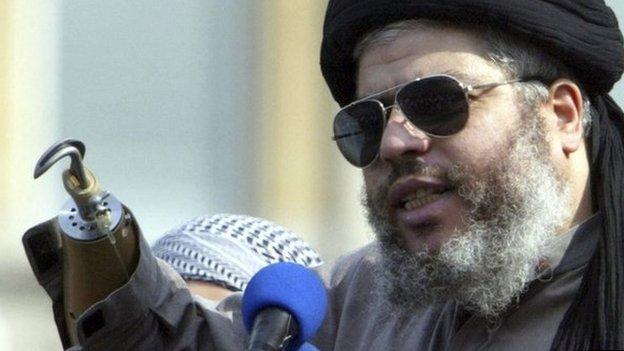Radical cleric Abu Hamza jailed for life by US court
- Published
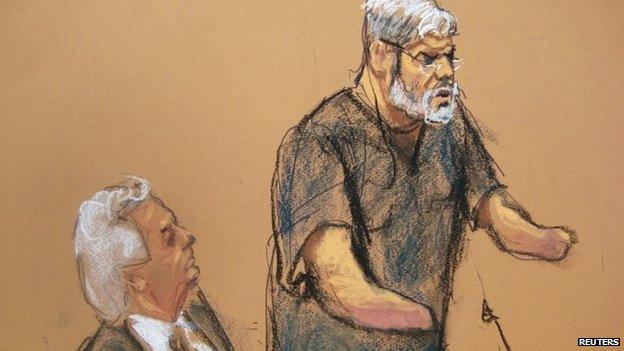
A judge said she could not think of a time when it would be safe to release Abu Hamza
Radical Muslim cleric Abu Hamza al-Masri has been sentenced to life in prison by a court in New York for supporting terrorism.
He was convicted in May of multiple charges, including hostage-taking and plotting to set up a terrorism training camp in the US.
His trial followed a lengthy extradition process from the UK.
During the sentencing, his lawyers asked the judge to take into account his missing hands and eye.
They also argued a plan to imprison Abu Hamza in Colorado's Supermax federal prison would violate assurances the US made to judges in London to secure his 2012 extradition.
Prosecutors argued on Friday that the US government had never made such a promise to the UK and life in prison was the only appropriate sentence.
Judge Katherine Forrest called Abu Hamza's actions "barbaric" and "misguided" and said she was sentencing him to life because she could not think of a time when it would be safe to release him.
She added she would leave the decision where he would spend his imprisonment to federal prison officials.

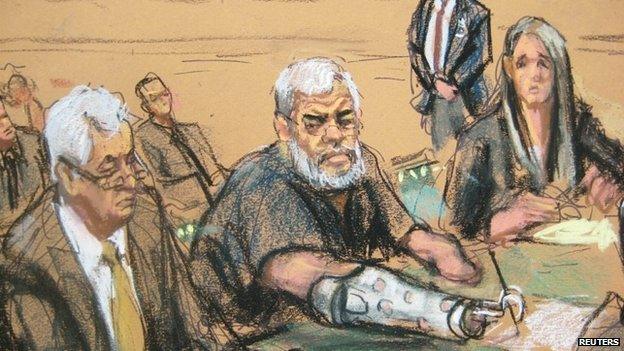
At the scene, Steve Swann, BBC News Home Affairs Reporter
Finally, after years of legal wrangling, it all ended here in a wood-paneled US courtroom close to the site where the Twin Towers once stood.
There was none of the trademark ranting from the firebrand cleric who for years had preached hatred and violence.
Today, dressed in prison overalls, when he was invited to address the crowded court he spoke quietly and asked for leniency. He said he was innocent and complained about his treatment in prison.
The judge read out the names of the four British tourists killed in the Yemen kidnapping in 1998 and described Abu Hamza's actions as barbaric.
The former nightclub bouncer turned extremist cleric was then sentenced to spend the remainder of his life in obscurity.

The US justice department hailed the sentence.
"Abu Hamza is an unrepentant all-purpose terrorist," Assistant Attorney General for National Security John Carlin said in a statement.
"With today's sentence, he is being held accountable for the many ways in which he supported terrorism and other terrorists through much of his life.
The cleric, who was born Mustafa Kamel Mustafa, was convicted last May in New York on 11 counts, including involvement in a plot to take Western tourists hostages in Yemen in 1998.
Three Britons and an Australian died when the Yemeni army launched a rescue bid.
Laurence Whitehouse, from Hampshire, UK, escaped but his wife Margaret was killed.
"There has been a gross injustice in the length of time taken in bringing these matters to a conclusion." Mr Whitehouse said.

Colorado's Supermax prison
Used for America's most dangerous inmates
Currently holds 400 inmates in the maximum security facility, and 901 in all
Houses men only, in almost permanent solitary confinement
Infamous inmates: Ted Kaczynski, Richard Reid, Zacarias Moussaoui and Umar Abdulmutallab
Just how bad are American 'supermax' prisons?
Source: US Bureau of Prisions

Prosecutors say Abu Hamza supplied the ringleader with a satellite phone.
Another family member of a victim was frustrated the legal proceedings had taken so long.
"My understanding is that British police possessed all the evidence that resulted in the decision announced today in the US," Donald Main, whose niece, Ruth Williamson, was killed.
"I have never understood why this judgement could not have been made many years ago by a UK court, thus avoiding the long very costly legal battles seeking to avoid extradition to the US."
In a statement, the Crown Prosecution Service said it had considered evidence related to the Yemen plot on "two separate occasions" but there said there was "simply insufficient evidence to allow a prosecution of those offences at the time".
Laurence Whitehouse's wife, Margaret, was killed when they were both kidnapped.
Abu Hamza was also convicted of helping to set up a terrorist training camp in the US state of Oregon.
His trial followed his extradition to the US in 2012 at the end of an eight-year legal battle.
During his trial Abu Hamza was described as a "terrorist facilitator with a global reach".
He had used his powerbase at the Finsbury Park Mosque in north London to encourage his followers to train and fight in the cause of jihad.
London's Metropolitan Police initially raided the mosque in 2003 but Abu Hamza escaped arrest, continuing to preach in the street outside.
Commander Richard Walton, head of the Met's Counter Terrorism Command said there would be "great relief in the country that Abu Hamza has been convicted of such serious terrorist offences".
The Met said it had provided the FBI with "a high volume of exhibits and case papers and facilitated several interviews with witnesses and victims in the UK" during the investigation.
British Home Secretary Teresa May said she was "pleased that Abu Hamza has finally faced justice."
"His sentence reflects the severity of his crimes and I am pleased he will spend the rest of his life behind bars where he belongs."
- Published9 January 2015
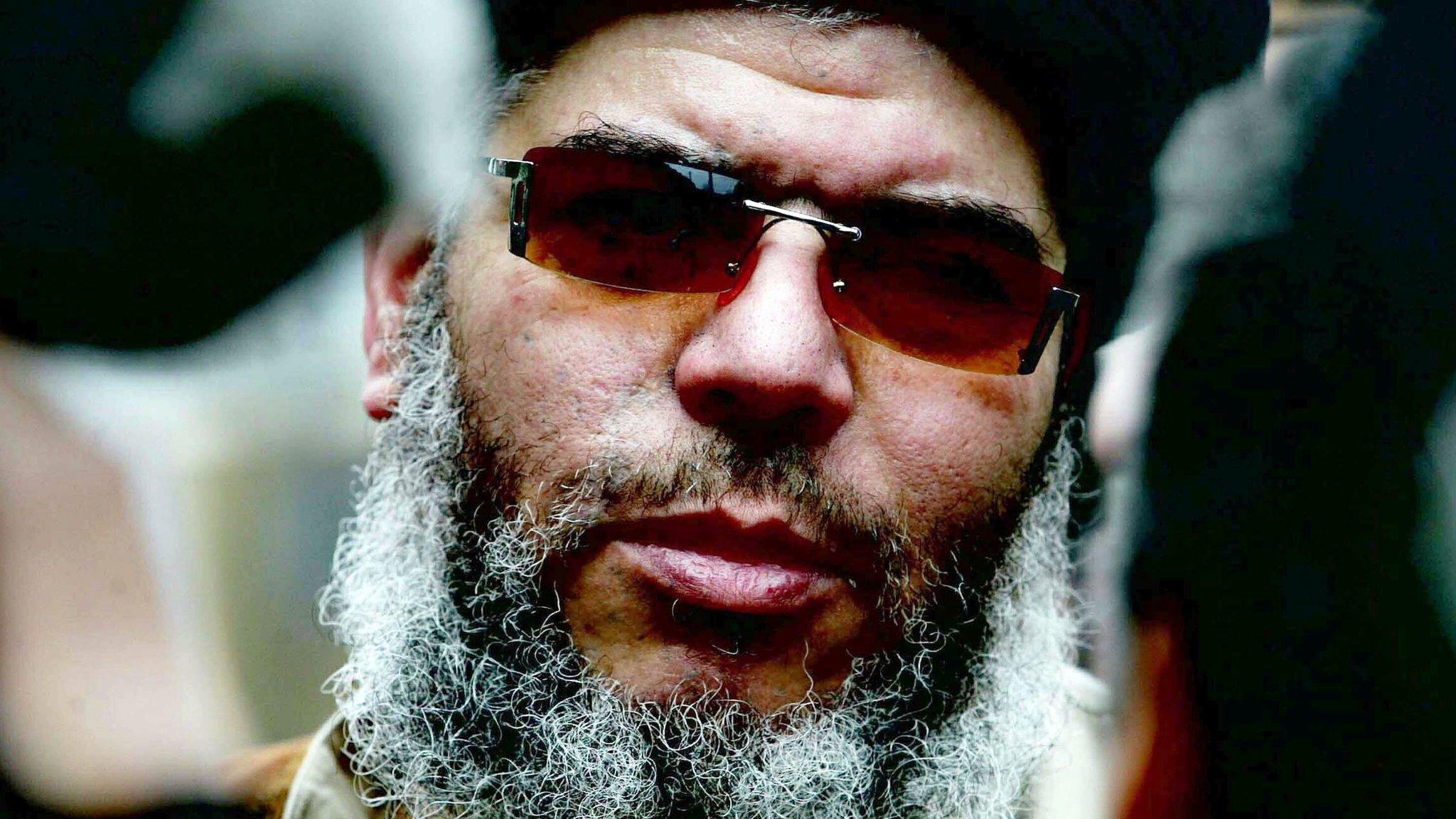
- Published5 October 2012
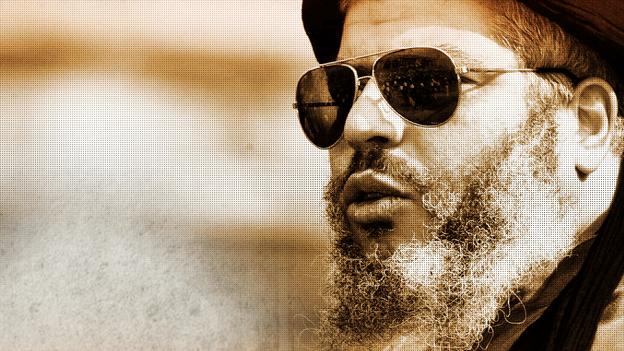
- Published9 January 2015
